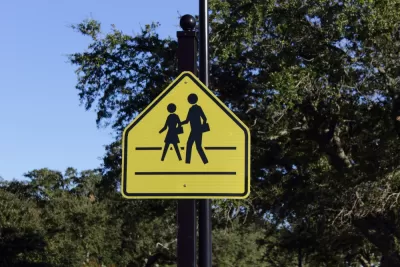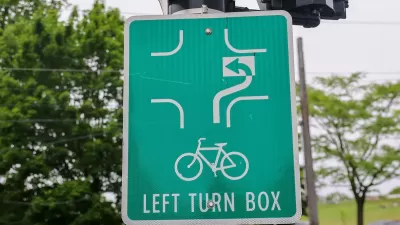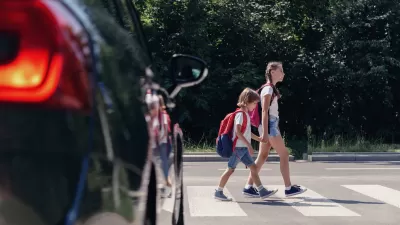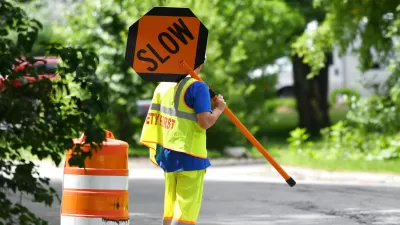The association's proposed changes to the manual include a focus on eliminating road deaths, improving pedestrian safety, and creating a more inclusive public process.

The National Association of City Transportation Officials (NACTO) has published a set of recommendations for updating the Manual on Uniform Traffic Control Devices (MUTCD) "into a proactive, multimodal safety regulation" as the Federal Highway Administration (FHWA) moves to update the document.
According to NACTO, "a reframed MUTCD is instrumental in pushing for safer, more sustainable, and equitable streets." Their recommended changes, based on "a full review of the MUTCD’s draft 11th edition with engineers, planners, and other practitioners across [NACTO's] member network," include:
- "Elevate the goal of eliminating serious injuries and deaths"
- "Modernize speed limits"
- "Make it safer to cross the street"
- "Promote people over robots on our streets"
- "Legalize commonsense treatments for people walking, biking, and taking transit"
- "Uplift best practices for bikeways, rather than prohibiting them"
- "Listen to more voices"
NACTO argues that "[i]ncorporating these comments would form the basis of a reframed, rewritten, and renewed MUTCD that prioritizes safety and the needs of more people on our streets." They also encourage the FHWA to prioritize a "more inclusive process for updating the MUTCD" that strives to understand the needs of communities that may not be able to take part in the current public comment process. "NACTO staff, and staff in our 89 member cities, were in the position to contribute hundreds of hours of time and expertise to inform the comments we’re submitting. But, many other key stakeholders affected by the MUTCD, including advocates for youth, elderly, and/or disabled, and climate, equity, and public health experts (overstretched at this time of many overlapping crises), do not have this time. The MUTCD will be a weaker document without their valuable input."
FULL STORY: A Blueprint to Update America’s Street Manual

Maui's Vacation Rental Debate Turns Ugly
Verbal attacks, misinformation campaigns and fistfights plague a high-stakes debate to convert thousands of vacation rentals into long-term housing.

Planetizen Federal Action Tracker
A weekly monitor of how Trump’s orders and actions are impacting planners and planning in America.

In Urban Planning, AI Prompting Could be the New Design Thinking
Creativity has long been key to great urban design. What if we see AI as our new creative partner?

King County Supportive Housing Program Offers Hope for Unhoused Residents
The county is taking a ‘Housing First’ approach that prioritizes getting people into housing, then offering wraparound supportive services.

Researchers Use AI to Get Clearer Picture of US Housing
Analysts are using artificial intelligence to supercharge their research by allowing them to comb through data faster. Though these AI tools can be error prone, they save time and housing researchers are optimistic about the future.

Making Shared Micromobility More Inclusive
Cities and shared mobility system operators can do more to include people with disabilities in planning and operations, per a new report.
Urban Design for Planners 1: Software Tools
This six-course series explores essential urban design concepts using open source software and equips planners with the tools they need to participate fully in the urban design process.
Planning for Universal Design
Learn the tools for implementing Universal Design in planning regulations.
planning NEXT
Appalachian Highlands Housing Partners
Mpact (founded as Rail~Volution)
City of Camden Redevelopment Agency
City of Astoria
City of Portland
City of Laramie





























